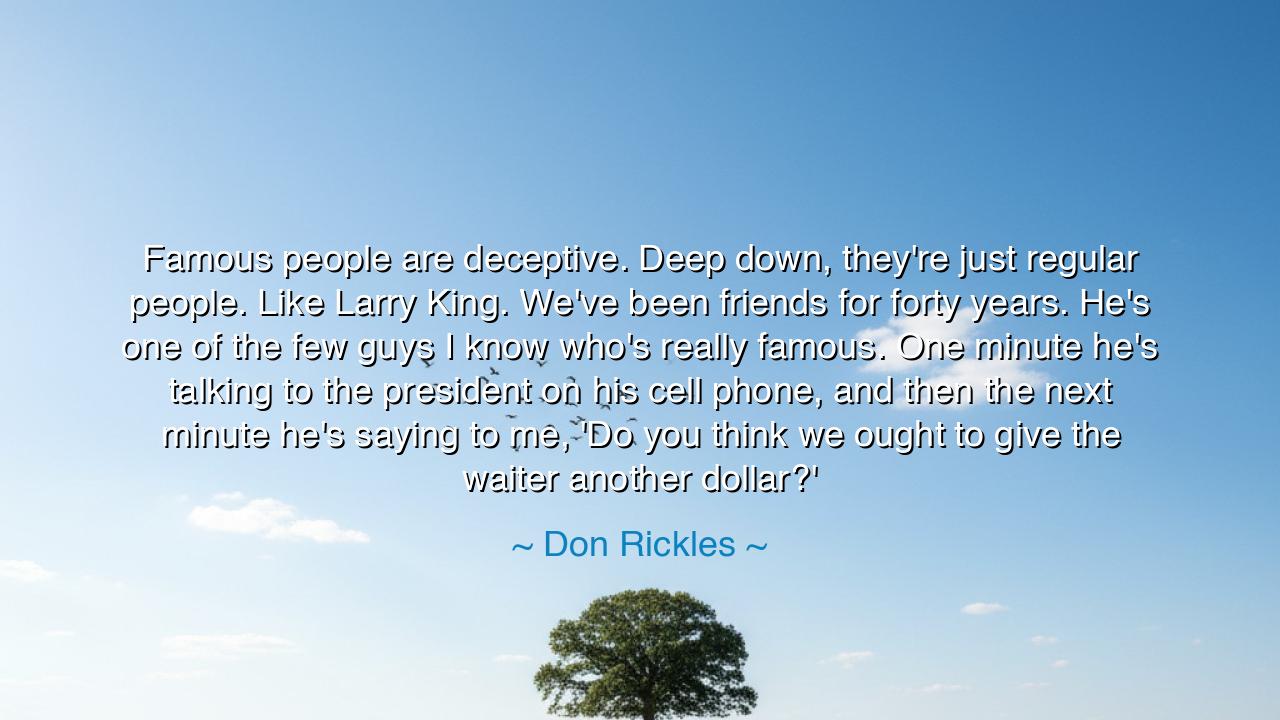
Famous people are deceptive. Deep down, they're just regular
Famous people are deceptive. Deep down, they're just regular people. Like Larry King. We've been friends for forty years. He's one of the few guys I know who's really famous. One minute he's talking to the president on his cell phone, and then the next minute he's saying to me, 'Do you think we ought to give the waiter another dollar?'






Host: The quiet hum of the evening filled the room, the soft light from the lamp casting a gentle glow across the space. Jack sat at the table, his fingers lightly resting on a notebook, reflecting on the words of Don Rickles. Jeeny stood by the window, her arms loosely folded, gazing out at the street as she absorbed the humor and truth in Rickles' statement.
Jeeny: “I’ve been thinking about what Don Rickles said: ‘Famous people are deceptive. Deep down, they're just regular people. Like Larry King. We've been friends for forty years. He's one of the few guys I know who's really famous. One minute he's talking to the president on his cell phone, and then the next minute he's saying to me, 'Do you think we ought to give the waiter another dollar?'’ It’s such a funny yet profound way of describing how fame doesn’t change the core of who someone is, does it?”
Jack: “Yes, it’s a perfect way of showing how fame can often be an illusion. Rickles uses the example of Larry King—this man who’s famous on a global scale, someone who speaks to presidents and world leaders, and yet, when it comes down to it, he’s still concerned about the little, everyday things. Rickles is pointing out that, no matter how famous you get, you’re still just a regular person dealing with the same human concerns as everyone else.”
Jeeny: “Exactly. Fame can create this larger-than-life persona, but at the end of the day, people are just people. Even Larry King, in all his fame, still worries about the small things, like tipping the waiter. Rickles is pointing out that, behind all the glitz and glamour, the essence of a person doesn’t change. We’re all navigating the same kinds of challenges, even if our lives look different from the outside.”
Host: The quiet in the room deepened as Jack’s fingers rested lightly on the table, considering how fame often creates an illusion of greatness that masks the very human reality behind it. Jeeny’s gaze softened as she thought about the way society elevates people based on their public status, but ultimately, they are still dealing with the same human experiences as anyone else.
Jack: “It’s funny, isn’t it? The contrast between how we view famous people and how they experience the world. We see them as above it all, as if fame somehow makes them different. But Rickles shows us the humility of fame, how it doesn’t change the ordinary human connections and concerns people still face, no matter how famous they are. It’s a reminder that at the core, everyone is just a regular person, doing their best to navigate life.”
Jeeny: “Yes, and I think that’s what makes Rickles’s words so relatable. He’s giving us a glimpse behind the curtain, showing us that fame doesn’t separate people from the real world, from the simple realities of living. King might be talking to the president one minute, but he’s also just a guy trying to figure out if he should tip a little extra to the waiter. That’s the humanity we all share, regardless of status or title.”
Jack: “And maybe that’s the beauty of it—the fact that no matter how high or low someone might seem, we all deal with the same essential parts of being human. Fame can create distance, but at the heart of it, people like Larry King are still navigating the everyday decisions we all face.”
Jeeny: “Exactly. And I think that’s why people like Larry King are so likable. The more genuine they are, the more they show that they’re just like the rest of us, even if their lives are different on the surface. It makes them relatable and accessible in a way that a lot of other people who are famous try to distance themselves from.”
Host: The stillness in the room felt deeper now, as the conversation turned inward, reflecting on the power of authenticity in the face of fame. Rickles had revealed something important—that the human experience is the great equalizer, no matter how much fame or success a person attains. Jack leaned back slightly in his chair, his fingers gently resting on the table, while Jeeny’s gaze softened, reflecting on how fame, when grounded in humility, can bring out the best in people.
Jack: “I think Rickles is reminding us that fame doesn’t change the things that matter. Even in a world obsessed with status, we still find meaning in the small, everyday moments. Fame might make someone a public figure, but it doesn’t take away the very human aspects of who they are.”
Jeeny: “Exactly. It’s a reminder that at the core, we’re all just people, no matter how famous we are, no matter how much attention we get. The things that matter—the relationships we build, the simple decisions we make—those are the things that ground us and connect us to each other.”
Host: The evening had fully settled in now, the conversation leaving behind a quiet realization. The idea that fame doesn’t change the core of who we are—that, at the heart of it all, we are still just people navigating the same world with the same human concerns—had taken root. The world outside had darkened, but inside, there was light—a reminder that fame, when stripped of its illusion, reveals the ordinary and the real in all of us.






AAdministratorAdministrator
Welcome, honored guests. Please leave a comment, we will respond soon